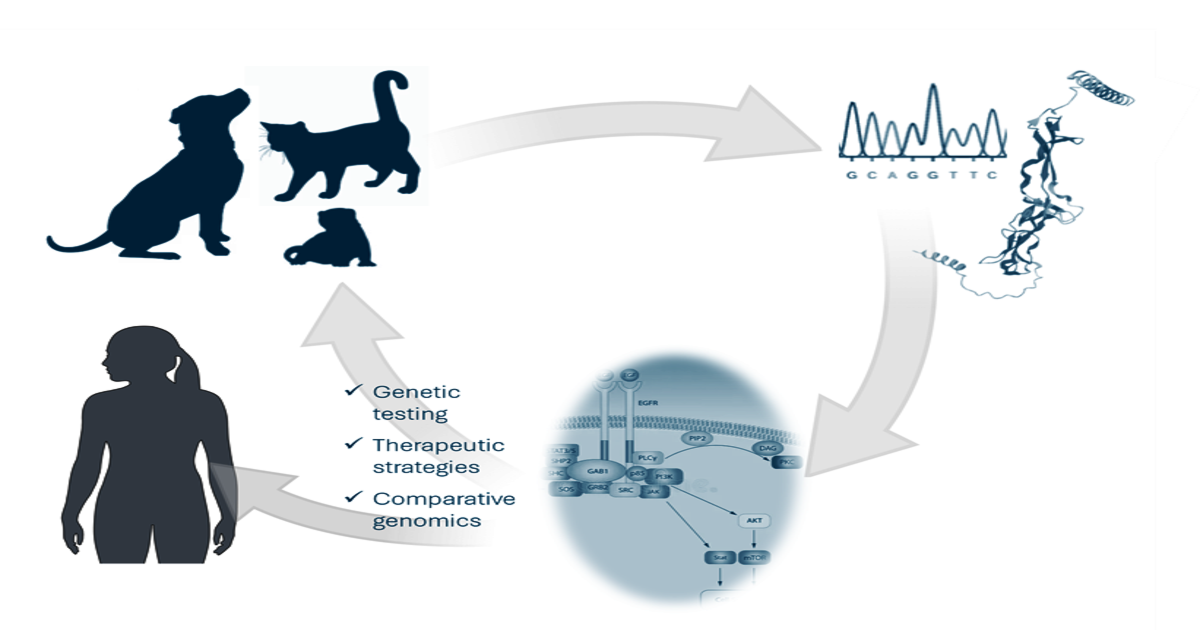Hereditary Traits and Diseases in Companion Animals
A special issue of Genes (ISSN 2073-4425). This special issue belongs to the section "Animal Genetics and Genomics".
Deadline for manuscript submissions: 25 December 2025 | Viewed by 1307

Special Issue Editors
2. U955–IMRB, Team 10–Biology of the Neuromuscular System, Inserm, UPEC, EFS, EnvA, Maisons-Alfort, France
Interests: canine genetics; animal genetics; animal breeding; animal models
Special Issues, Collections and Topics in MDPI journals
2. INMG (Institut NeuroMyogène), CNRS UMR 5310—INSERM U1217—UCBL1-Université de Lyon, Lyon, France
Interests: feline genetics; animal genetics; animal breeding; animal models
Special Issues, Collections and Topics in MDPI journals
Special Issue Information
Dear Colleagues,
The domestication, breed development, and selective breeding of companion animals have created unique populations with diverse and well-documented phenotypes. Dogs, cats, rabbits, ferrets, and other companion species offer exceptional models for exploring the genetic basis of morphology, behavior, and diseases. Studying hereditary traits in these animals not only supports responsible breeding practices that integrate health and welfare but also contributes to biomedical research and comparative genetics.
Spontaneous hereditary diseases in companion animals often mirror those in humans, providing highly valuable models for understanding pathophysiological mechanisms and developing therapeutic strategies in various medical fields. Characterizing the genetic determinism of these traits also facilitates the development of molecular tools for reasoned selection, balancing morphology and behavior with health-related concerns.
This Special Issue aims to gather original research articles and critical reviews that address all aspects of hereditary traits and diseases in companion animals. We welcome contributions across a range of disciplines, including, but not limited to, behavioral genetics, inherited disorders, cancer genetics, and traits of breeding interest such as coat color and texture, morphology, and reproductive characteristics.
By highlighting advances in the genetics of companion animals, this Special Issue seeks to enhance both animal health and our understanding of shared biological mechanisms between species.
Dr. Lucie Chevallier
Prof. Dr. Marie Abitbol
Guest Editors
Manuscript Submission Information
Manuscripts should be submitted online at www.mdpi.com by registering and logging in to this website. Once you are registered, click here to go to the submission form. Manuscripts can be submitted until the deadline. All submissions that pass pre-check are peer-reviewed. Accepted papers will be published continuously in the journal (as soon as accepted) and will be listed together on the special issue website. Research articles, review articles as well as short communications are invited. For planned papers, a title and short abstract (about 100 words) can be sent to the Editorial Office for announcement on this website.
Submitted manuscripts should not have been published previously, nor be under consideration for publication elsewhere (except conference proceedings papers). All manuscripts are thoroughly refereed through a single-blind peer-review process. A guide for authors and other relevant information for submission of manuscripts is available on the Instructions for Authors page. Genes is an international peer-reviewed open access monthly journal published by MDPI.
Please visit the Instructions for Authors page before submitting a manuscript. The Article Processing Charge (APC) for publication in this open access journal is 2600 CHF (Swiss Francs). Submitted papers should be well formatted and use good English. Authors may use MDPI's English editing service prior to publication or during author revisions.
Keywords
- genetic traits
- hereditary diseases
- companion animals
- spontaneous disease models
- veterinary genetics
- genetic selection
- breed-specific diseases
Benefits of Publishing in a Special Issue
- Ease of navigation: Grouping papers by topic helps scholars navigate broad scope journals more efficiently.
- Greater discoverability: Special Issues support the reach and impact of scientific research. Articles in Special Issues are more discoverable and cited more frequently.
- Expansion of research network: Special Issues facilitate connections among authors, fostering scientific collaborations.
- External promotion: Articles in Special Issues are often promoted through the journal's social media, increasing their visibility.
- Reprint: MDPI Books provides the opportunity to republish successful Special Issues in book format, both online and in print.
Further information on MDPI's Special Issue policies can be found here.







